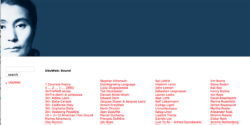What if I told you there’s an online archive of hundreds of avant-garde media works that exists with little regard for copyright, though it respects the wishes of artists and their estates? Would you believe it’s been there for 22 years, without fail?
That archive is UbuWeb. I’m pretty sure I first learned about it a dozen years ago from the dearly departed (but still available) WFMU Beware of the Blog. The project was actually funded by a former ‘FMU DJ, Kenny G, a/k/a Kenneth Goldsmith, a poet and uncreative writing teacher at the University of Pennsylvania.
For the 15-year anniversary of UbuWeb Goldsmith wrote,
UbuWeb began in 1996 as a site focusing on visual and concrete poetry. With the advent of the graphical web browser, we began scanning old concrete poems, astonished by how fresh they looked backlit by the computer screen. Shortly thereafter, when streaming audio became available, it made sense to extend our scope to sound poetry, and as bandwidth increased we later added MP3s as well as video. Sound poetry opened up a whole new terrain: certain of John Cage’s readings of his mesostic texts could be termed “sound poetry,” hence we included them.
Focusing more on the sound archive, he continues,
In 2005, we acquired a collection called The 365 Days Project, a year’s worth of outrageous MP3s that can be best described as celebrity gaffs, recordings of children screeching, how-to records, song-poems, propagandistic religious ditties, spoken word pieces, even ventriloquist acts. However, buried deep within The 365 Days Project were rare tracks by the legendary avant-gardist Nicolas Slominsky, an early-to-mid-twentieth century conductor, performer, and composer belting out advertisements and children’s ditties on the piano in an off-key voice. UbuWeb had already been hosting historical recordings from the 1920s he conducted of Charles Ives, Carl Ruggles, and Edgard Varèse in our Sound section, yet nestled in amongst oddballs like Louis Farrakhan singing calypso or high school choir’s renditions of “Fox On The Run,” Slominsky fit into both categories—high and low—equally well.
Radio Survivor, of course, is all about sound and radio, and there is plenty of the latter. In fact, many titles come from broadcasts on the country’s first community radio station, KPFA. This includes recordings of the aforementioned Slominsky, John Cage and avant-garde musician Charlotte Moorman.
UbuWeb came back into my consciousness by way of a late night internet garden path walk. After attending a screening of Sonic Youth-related documentary pieces and filmed live performances, I went looking for a way to see the entirety of the Charles Atlas documentary “Put Blood in the Music,” a portion of which was part of the screening.
Coming up empty, it occurred to me that it might be on Ubu. Turns out, it’s not. However, as I got to clicking around, watching and listening I became fully entranced (again).
Over the last weekend I’ve enjoyed John Oswald‘s pioneering copyright-jamming “Plunderphonics,” the works of Argentinian new music composer Alan Courtis and a playlist of “History of Electronic / Electroacoustic Music (1937-2001).” When I have trouble deciding amongst the vast catalog of artists, I just turn on UbuWeb Radio, hosted by WFMU:
For those concerned about Ubu’s laissez-faire attitude about copyright, I’ll refer you to an interview that radio scholar Brian Fauteux conducted with Goldsmith in 2014 for Radio Survivor. Therein he explains the site’s value founded on the contemporary reality that, “[i]f it doesn’t exist on the internet, it doesn’t exist.”
Then there is the note at the bottom of the sounds page that reads, in part:
we don’t wish to take whatever small profits might be made from those taking the efforts to gather, manufacture and properly distribute such recordings. Instead, we hope that by streaming these works, it will serve as an enticement for UbuWeb visitors to support the small labels making this work available.
All MP3s served on UbuWeb are either out-of-print, incredibly difficult to find, or, in our opinion, absurdly overpriced.
Moveover, the site’s volunteer curators and administrators have often worked with artists and their estates to take down works or add other ones upon request. Again, the idea is not to pirate or help would-be consumers circumvent buying recordings. Rather, in most cases these recordings are not commercially available, may never have been, or are utterly out-of-print and not released in any contemporary digital formats.
There is always a balance between retaining an accessible cultural history and absolute obedience to the letter of the law. Somewhere in that fuzzy middle lies an approach where one might ask forgiveness, if necessary, rather than putting on your own handcuffs and lacing up your straightjacket.
As Goldsmith told Brian Fauteux, “An archive activist is someone who does what they do without asking permission or securing funds. They simple do it — and then let the world deal with the fact that it is done. If we had to ask for permission, we wouldn’t exist.”
I think that’s quite compatible with the ethos freeform community and college radio, where DJs are allowed or even encouraged to play works from far outside the mainstream and collage them together, whether or not the disc, tape, file or found sound was expressly sent to the station for broadcast. I have no doubts that dozens or hundreds of DJs are violating the letter of copyright law right now, and yet nothing will come of it. That’s because whatever violation is happening is victimless.
Central to this ethos is that these platforms are truly non-profit and non-commercial. No money is lost and no artist loses a sale (or the .0001 cents they get from a play on Spotify).
And if some artist calls the station and says, “please don’t play my work,” my advice is to respect their wishes. But how many calls like that have you received? Right.



